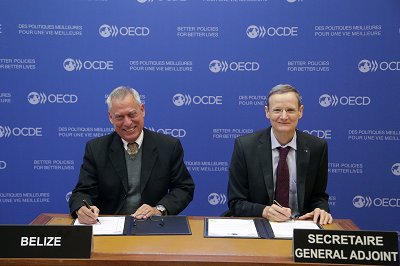Belize
Belize signs landmark agreement to strengthen its tax treaties and Monaco deposits its instrument of ratification for the Multilateral BEPS Convention
11/01/2019 – Today, Belize signed the Multilateral Convention to Implement Tax Treaty Related Measures to Prevent Base Erosion and Profit Shifting (the Convention), becoming the 86th jurisdiction to join the Convention, which now covers almost 1,500 bilateral tax treaties.
|
In addition, Monaco yesterday deposited its instrument of ratification for the Convention with the OECD’s Secretary-General, Angel Gurría, therewith underlining its strong commitment to prevent the abuse of tax treaties and base erosion and profit shifting (BEPS) by multinational enterprises.
|
(Left to right: H.E. Mr. Joseph D. Waight, Financial Secretary of Belize, Mr. Ludger Schuknecht, OECD Deputy Secretary-General) |
The Convention, negotiated by more than 100 countries and jurisdictions under a mandate from the G20 Finance Ministers and Central Bank Governors, is one of the most prominent results of the OECD/G20 BEPS Project. It is the world’s leading instrument for updating bilateral tax treaties and reducing opportunities for tax avoidance by multinational enterprises. Measures included in the Convention address treaty abuse, strategies to avoid the creation of a “permanent establishment”, and hybrid mismatch arrangements. The Convention also enhances the dispute resolution mechanism, especially through the addition of an optional provision on mandatory binding arbitration, which has been taken up by 28 jurisdictions.
The text of the Convention, the explanatory statement, background information, database, and positions of each signatory are available at http://oe.cd/mli.
Journalists wishing to obtain further information are invited to contact Pascal Saint-Amans, Director of the Centre for Tax Policy and Administration (CTP) or the CTP Communications team.
Related Documents
